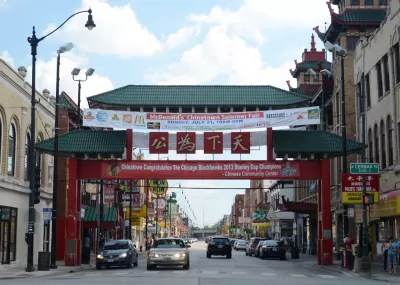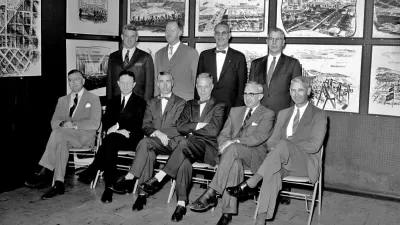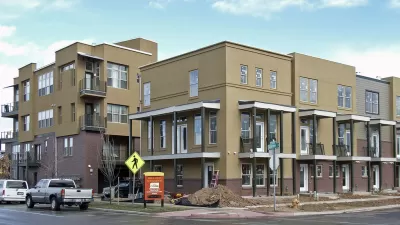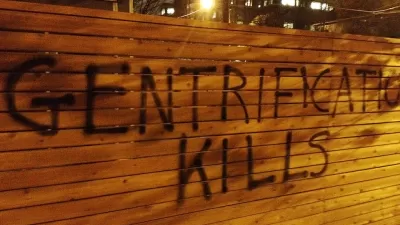How do you address a history of anti-Asian housing discrimination? Not by destroying Asian American communities.

In May, Stop AAPI Hate reported a 74 percent jump in hate incidents against Asian Americans from the previous year. Most of these incidents occurred in public spaces—streets and parks—and have even resulted in the tragic deaths of elders who were killed as they were walking while Asian American. Media reports of this rising violence has awakened many Americans to the racism Asian Americans face. But racial violence, including expulsion from one’s home, against Asian Americans is not a new phenomenon. It has been part of the defining experience of Asian Americans for 170 years.
For instance, in 2003, 50 predominantly low-income Asian immigrant seniors in Oakland, California’s Chinatown received eviction notices and had no place to go.
In 1986, 21 Cambodian Americans in Revere, Massachusetts, were burned out of their homes by hate crime arson.
In 1977, San Francisco riot police entered San Francisco’s I Hotel to forcibly evict all of its tenants, most of whom were low-income elderly Filipinos.
In 1942, 120,000 Japanese Americans, most of whom were U.S. citizens, were forcibly removed from their homes and incarcerated in prison camps, without any due process.
From the 1900s to the 1960s, racially restrictive housing covenants in many cities including throughout California, Seattle, Minneapolis, and Boston, targeted Chinese and Japanese Americans along with Black Americans.
In 1880, an angry mob violently destroyed Denver’s Chinatown and attacked Chinese residents, including lynching one person.
That our summary listing from the annals of Asian American experiences of racist exclusion and violence may be news for some readers speaks to the erasure of Asian Americans from U.S. history and our collective racial consciousness.
As our nation embarks on the current iteration of racial reckoning, understanding the long history of racial exclusion against Asian Americans should not be left out of the discussion. That long history of racialized oppression forced our ancestors into ethnic enclaves, both by law but also for community and self-preservation. Today the laws are different, as they should be, but for many Asian Americans, ethnic enclaves still provide essential places, especially in the context of periodic rises in anti-Asian American hate, as we’re sadly experiencing today. The ability to access the sense of belonging as well as concrete services is under attack by the forces of displacement and well-intentioned but misguided “race-neutral” housing policies.
Why Ethnic Enclaves Are Essential Places
Racist and misogynistic laws excluded and denied Asian Americans the right to home and belonging from their first day in America. The first federal immigration law ...
FULL STORY: In Defense of Asian American Neighborhoods

Alabama: Trump Terminates Settlements for Black Communities Harmed By Raw Sewage
Trump deemed the landmark civil rights agreement “illegal DEI and environmental justice policy.”

Study: Maui’s Plan to Convert Vacation Rentals to Long-Term Housing Could Cause Nearly $1 Billion Economic Loss
The plan would reduce visitor accommodation by 25% resulting in 1,900 jobs lost.

Planetizen Federal Action Tracker
A weekly monitor of how Trump’s orders and actions are impacting planners and planning in America.

Waymo Gets Permission to Map SF’s Market Street
If allowed to operate on the traffic-restricted street, Waymo’s autonomous taxis would have a leg up over ride-hailing competitors — and counter the city’s efforts to grow bike and pedestrian on the thoroughfare.

Parklet Symposium Highlights the Success of Shared Spaces
Parklets got a boost during the Covid-19 pandemic, when the concept was translated to outdoor dining programs that offered restaurants a lifeline during the shutdown.

Federal Homelessness Agency Places Entire Staff on Leave
The U.S. Interagency Council on Homelessness is the only federal agency dedicated to preventing and ending homelessness.
Urban Design for Planners 1: Software Tools
This six-course series explores essential urban design concepts using open source software and equips planners with the tools they need to participate fully in the urban design process.
Planning for Universal Design
Learn the tools for implementing Universal Design in planning regulations.
Caltrans
Smith Gee Studio
Institute for Housing and Urban Development Studies (IHS)
City of Grandview
Harvard GSD Executive Education
Toledo-Lucas County Plan Commissions
Salt Lake City
NYU Wagner Graduate School of Public Service





























